CFC Mentorship Helps Students Advance the Way of Christ in Culture
Mary Asta Halvorsen | August 02, 2024
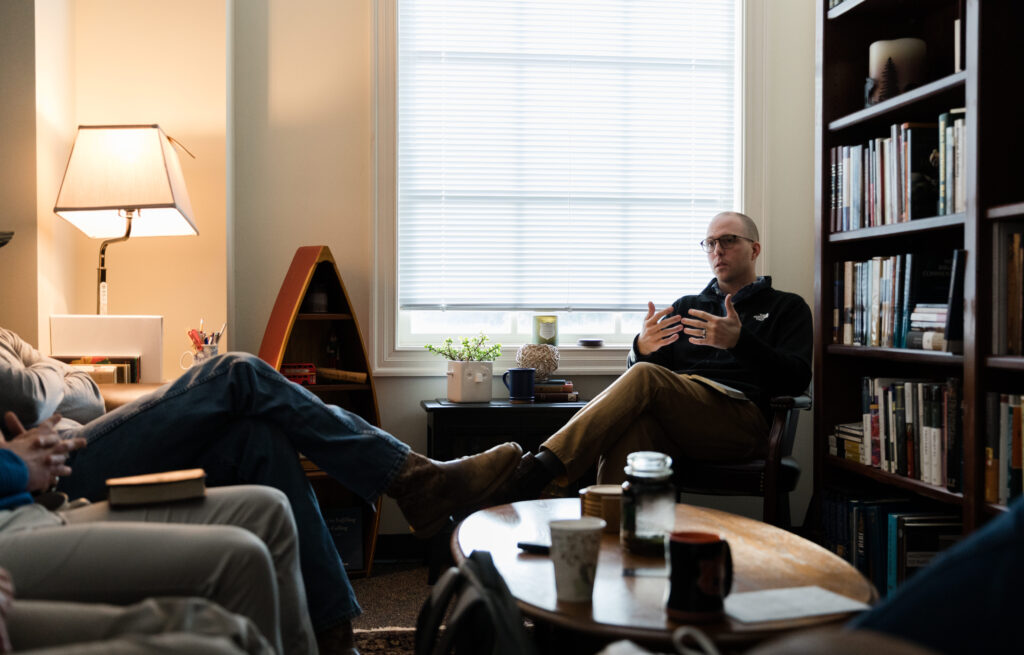
Southeastern’s L. Russ Bush Center for Faith and Culture (CFC) resides on the second floor of Carson Hall, where pale morning sunlight falls through big windows.
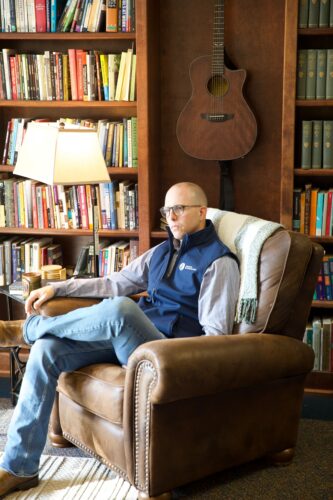 On an early Thursday morning, I sat in Benjamin Quinn’s office to ask him questions about the CFC Mentorship Program. Associate Professor of Theology and History of Ideas and director of the CFC, Quinn insisted first that he make us a fresh pot of French press coffee as we enjoyed casual conversation and a few laughs over sports. This intentional hospitality, I later realized, summed up what I would soon learn about this mentorship program.
On an early Thursday morning, I sat in Benjamin Quinn’s office to ask him questions about the CFC Mentorship Program. Associate Professor of Theology and History of Ideas and director of the CFC, Quinn insisted first that he make us a fresh pot of French press coffee as we enjoyed casual conversation and a few laughs over sports. This intentional hospitality, I later realized, summed up what I would soon learn about this mentorship program.
“Let me ground our vision for the program in the mission of the Center,” Quinn told me. “The mission of the CFC is that we exist to equip students to advance the way of Christ in all of culture. Mentorship is a key way that we do that.”
“If this is truly God’s world,” Quinn added with conviction and excitement, “then Jesus is King of this world, and he has taught us to pray, ‘Your kingdom come, and your will be done on earth as it is in heaven’ — then in every time and space that we occupy on this earth, our job is to connect these dots and to actually live all of life before Jesus. And for our students, it’s especially important for them to be able to equip the people they serve to do that. That’s what Mentorship 101 seeks to do.”
In every time and space that we occupy on this earth, our job is to connect these dots and to actually live all of life before Jesus.
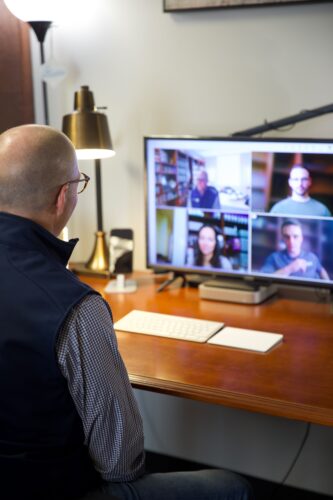
Mentorship 101 is the name for the Center’s current mentorship program, which has encouraged and resourced students for almost fifteen years. The program takes place over two semesters, starting in the fall and ending in the spring. It is open to undergraduate, graduate, and doctoral students with no prerequisite requirements. The mentorship is available as course credit for Intro to Theology and Culture, but participating in the program for credit is not required. In fact, individuals who are interested in the mentorship but are not currently enrolled as Southeastern students can also submit an application to participate in the program.
“Is it open to distance learning students as well?” I asked.
Quinn said it certainly is and was especially excited to explain how this might work. He described a conversation he had with a friend in Kansas who was considering joining the program with some of his peers.
“I told him, ‘Why don’t you find your own table, put some food and coffee around it, turn your computer on, and you guys can sit there at your table while we sit at ours and carry on the conversation. You don’t have to be here. You can join in virtually, and we’ll do our best to make sure that it still has the feeling of fellowship,” Quinn said.
In the coming years, Quinn has plans to expand the mentorship program beyond 101 to Mentorship 201 and 301. These two tracks would build on Mentorship 101 and allow for increased student involvement at the Center.
Quinn explained that over the course of two semesters, the mentorship group will meet once a month on Wednesday evening, likely for dinner and coffee. During these meetings, their conversations will be guided by a book they read throughout the semester as they discuss a wide range of topics.
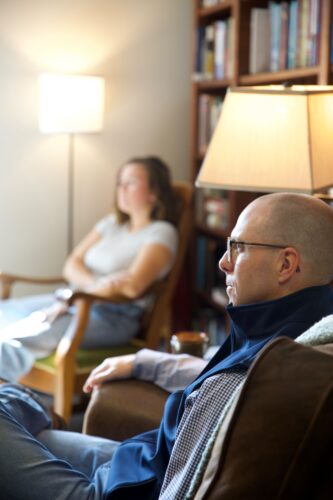
“Mentorship 101 will function as an introduction or ‘Cultural Catechesis’ using Dennis Greeson’s and my book ‘The Way of Christ in Culture’ to orient students to the conversation and prepare them for deeper engagement with particular cultural spheres such as art, economics, education, politics, etc.”
Program participants also go on trips. In the past, these trips have included viewing a debate or scientific presentation at a nearby university, attending a concert of Handel’s Messiah, visiting a relevant museum, watching a ball game, and more.
In exploring the intersection of faith and culture, Quinn noted, the mentorship also creates the opportunity to discuss ideas and culture outside of Western Civilization, leading to deeper, more comprehensive conversations.
Quinn explained it as such: “Let’s just say there’s an English major student from Winston Salem. There’s also a biblical studies student from South Korea and a business major student from South Africa. All of a sudden culture means something different to us all.” He explained, “There’s a lot of diversity in there. And yet they are reading the same text, the same gospel, the same one Lord, one faith, one baptism. But how then do we go back to our respective places and apply these things in ways that are faithful to the gospel and contextually appropriate?”
How then do we go back to our respective places and apply these things in ways that are faithful to the gospel and contextually appropriate?
Why is it so important that Southeastern students learn to think well and address these different issues? Quinn had a profound insight on this question.
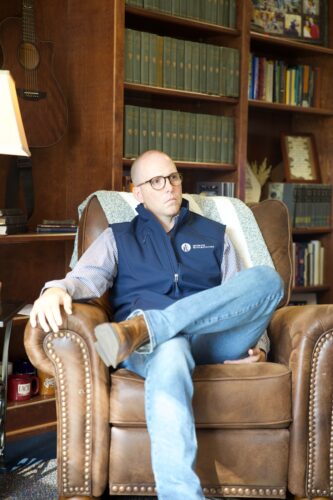
Many of Southeastern’s students are preparing for some type of ministry, placing them in positions to serve many people, both in and outside of the church. These students are leaders, and as such, they must be firmly grounded in God’s word and his truth, knowing how to apply that truth in every aspect of life, Monday through Saturday – not just on Sunday mornings.
Quinn has seen many students in the mentorship program be transformed in their understanding of Christ’s supremacy in their lives and in the world.
“All of a sudden,” he said, “they see that King Jesus is king over the whole creation — that it still belongs to him, and that creation is still good because God made it. So, they also see with fresh eyes the depth of sin’s destruction, perversion, and parasitic nature on creation. And yet it is still good because God made it so. And so now, how do we live even in that tension?”
“How do I live in light of this gospel that I’ve been changed by and that I believe in — now that I’ve been filled with the Spirit of God?” Quinn said. “Between the advents of Christ, how do I live and walk with integrity? How do I live saying, ‘Your kingdom come and your will be done’ — in every time and space that I’m in, whether that’s a virtual space of social media, or whether that’s a physical space of family, life, and everything in between.”
“I have seen the mentorship lead to one ‘aha’ moment after another of connecting those dots and really living more coherent, Christ-centered lives,” Quinn added.
To apply for the mentorship program or to learn more about how the CFC is equipping students to advance the way of Christ in all of culture, visit cfc.sebts.edu.